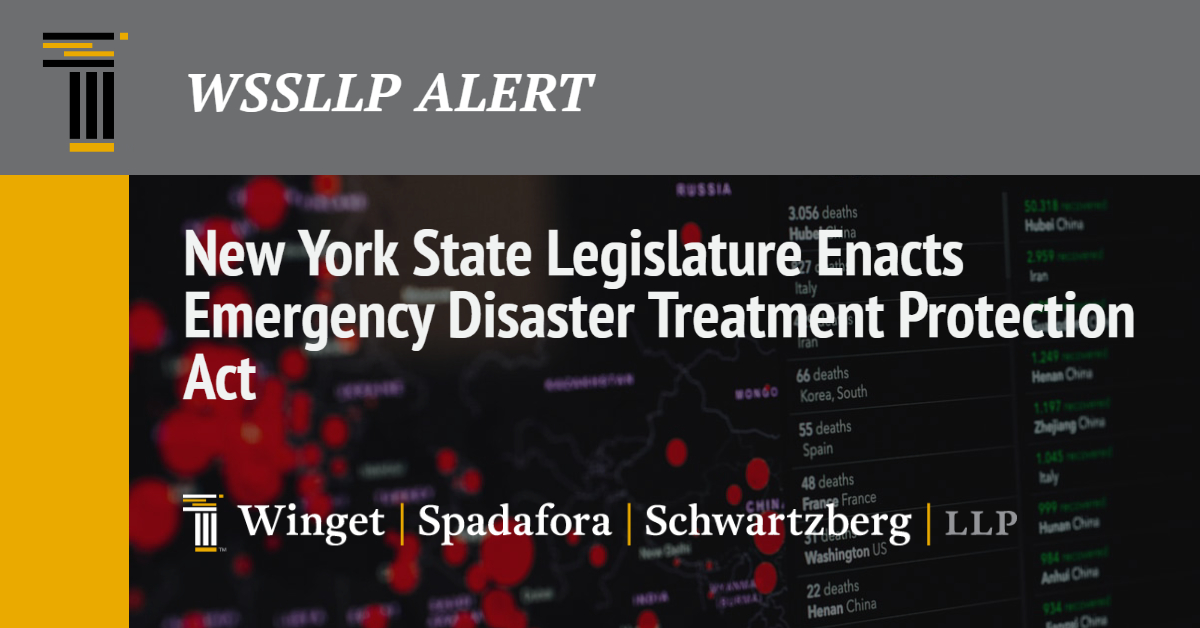In order to shield healthcare facilities and healthcare professionals from potential civil and/or criminal liability resulting from care and treatment rendered to both COVID-19 patients and non-COVID-19 patients during the COVID-19 crisis, the New York State Legislature has included the Emergency Disaster Treatment Protection Act (“EDTPA”) in the state fiscal year 2021 budget. The EDTPA, designated as Article 30-D of the Public Health Law, provides a qualified immunity to healthcare facilities and healthcare professionals from civil and criminal liability arising from decisions, acts, and omissions occurring from Governor Andrew Cuomo’s March 7, 2020 Emergency Declaration through the expiration of such Emergency Declaration.
Who is protected under the EDTPA?
The healthcare facilities and professionals afforded protection under the EDTPA include the following:
- Hospitals, nursing homes, and other healthcare facilities licensed under the relevant provisions of the Public Health Law, Mental Hygiene Law, or the COVID-19 Emergency Rule.
- Physicians, physician assistants, nurses, nursing attendants, certified nursing aides, emergency medical technicians, home care service workers, and other designated healthcare professionals.
- Healthcare facility administrators, executives, supervisors, board members, trustees, or other persons responsible for directing, supervising, or managing a healthcare facility and its personnel during the COVID-19 crisis.
What protections are provided under the EDTPA?
Pursuant to the EDTPA, healthcare facilities and healthcare professionals shall have immunity from civil or criminal liability for any harm or damages alleged to have been sustained as a result of an act or omission in the course of arranging for or providing healthcare services if (a) the healthcare facility or healthcare professional is arranging for or providing healthcare services pursuant to a COVID-19 emergency rule or otherwise in accordance with applicable law; (b) the act or omission occurs in the course of arranging for or providing healthcare services and the treatment of the individual is impacted by the healthcare facility’s or healthcare professional’s decisions or activities in response to or as a result of the COVID-19 outbreak and in support of the state’s directives; and (c) the healthcare facility or healthcare professional is arranging for or providing healthcare services in good faith.
The EDTPA defines “healthcare services” as services that relate to (a) the diagnosis, prevention, or treatment of COVID-19; (b) the assessment or care of an individual with a confirmed or suspected case of COVID-19; or (c) the care of any other individual who presents at a healthcare facility or to a healthcare professional during the period of the COVID-19 emergency declaration.
Are there exceptions to the protections provided by the EDTPA?
There is one exception to the protections provided to healthcare facilities and healthcare professionals by the EDTPA. Specifically, the immunity provided by the EDTPA “shall not apply if the harm or damages were caused by an act or omission constituting willful or intentional criminal misconduct, gross negligence, reckless misconduct, or intentional infliction of harm by the healthcare facility or healthcare professional providing healthcare services.”
Importantly, however, acts, omissions, or decisions resulting from a resource or staffing shortage are explicitly exempted from being considered willful or intentional criminal misconduct, gross negligence, reckless misconduct, or intentional infliction of harm. As such, in the event of an overwhelming surge of patients requiring medical care, this provision of the EDTPA will protect healthcare facilities and healthcare professionals against potential actions stemming from decisions made in the rationing of medical devices and services.
In sum, the EDTPA provides broad civil and criminal liability protection to healthcare facilities and healthcare professionals treating the surge of patients during the COVID-19 crisis. For more information regarding the EDPTA or its applicability, please contact:







